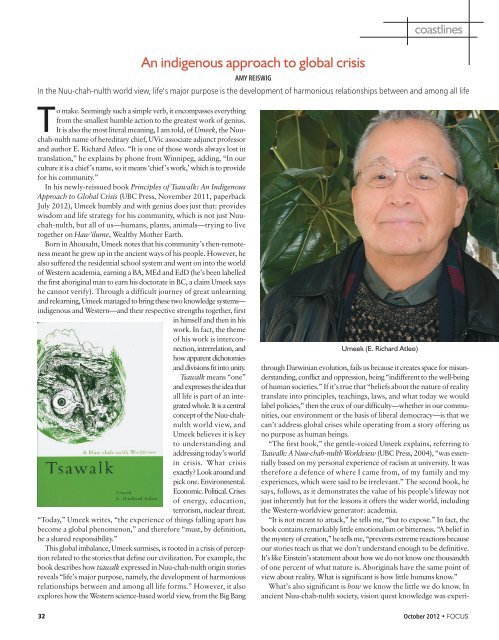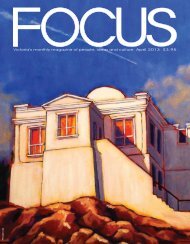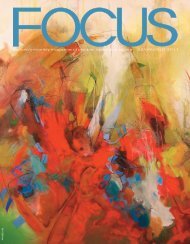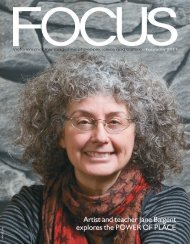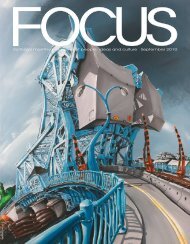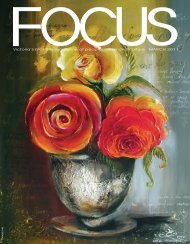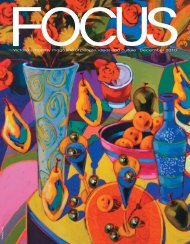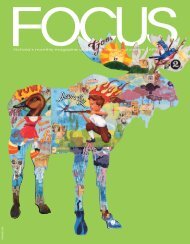**October 2012 Focus - Focus Magazine
**October 2012 Focus - Focus Magazine
**October 2012 Focus - Focus Magazine
Create successful ePaper yourself
Turn your PDF publications into a flip-book with our unique Google optimized e-Paper software.
An indigenous approach to global crisis<br />
AMY REISWIG<br />
In the Nuu-chah-nulth world view, life’s major purpose is the development of harmonious relationships between and among all life<br />
To make. Seemingly such a simple verb, it encompasses everything<br />
from the smallest humble action to the greatest work of genius.<br />
It is also the most literal meaning, I am told, of Umeek, the Nuuchah-nulth<br />
name of hereditary chief, UVic associate adjunct professor<br />
and author E. Richard Atleo. “It is one of those words always lost in<br />
translation,” he explains by phone from Winnipeg, adding, “In our<br />
culture it is a chief’s name, so it means ‘chief’s work,’ which is to provide<br />
for his community.”<br />
In his newly-reissued book Principles of Tsawalk: An Indigenous<br />
Approach to Global Crisis (UBC Press, November 2011, paperback<br />
July <strong>2012</strong>), Umeek humbly and with genius does just that: provides<br />
wisdom and life strategy for his community, which is not just Nuuchah-nulth,<br />
but all of us—humans, plants, animals—trying to live<br />
together on Haw’ilume, Wealthy Mother Earth.<br />
Born in Ahousaht, Umeek notes that his community’s then-remoteness<br />
meant he grew up in the ancient ways of his people. However, he<br />
also suffered the residential school system and went on into the world<br />
of Western academia, earning a BA, MEd and EdD (he’s been labelled<br />
the first aboriginal man to earn his doctorate in BC, a claim Umeek says<br />
he cannot verify). Through a difficult journey of great unlearning<br />
and relearning, Umeek managed to bring these two knowledge systems—<br />
indigenous and Western—and their respective strengths together, first<br />
in himself and then in his<br />
work. In fact, the theme<br />
of his work is interconnection,<br />
interrelation, and<br />
how apparent dichotomies<br />
and divisions fit into unity.<br />
Tsawalk means “one”<br />
and expresses the idea that<br />
all life is part of an integrated<br />
whole. It is a central<br />
concept of the Nuu-chahnulth<br />
world view, and<br />
Umeek believes it is key<br />
to understanding and<br />
addressing today’s world<br />
in crisis. What crisis<br />
exactly? Look around and<br />
pick one. Environmental.<br />
Economic. Political. Crises<br />
of energy, education,<br />
terrorism, nuclear threat.<br />
“Today,” Umeek writes, “the experience of things falling apart has<br />
become a global phenomenon,” and therefore “must, by definition,<br />
be a shared responsibility.”<br />
This global imbalance, Umeek surmises, is rooted in a crisis of perception<br />
related to the stories that define our civilization. For example, the<br />
book describes how tsawalk expressed in Nuu-chah-nulth origin stories<br />
reveals “life’s major purpose, namely, the development of harmonious<br />
relationships between and among all life forms.” However, it also<br />
explores how the Western science-based world view, from the Big Bang<br />
Umeek (E. Richard Atleo)<br />
coastlines<br />
through Darwinian evolution, fails us because it creates space for misunderstanding,<br />
conflict and oppression, being “indifferent to the well-being<br />
of human societies.” If it’s true that “beliefs about the nature of reality<br />
translate into principles, teachings, laws, and what today we would<br />
label policies,” then the crux of our difficulty—whether in our communities,<br />
our environment or the basis of liberal democracy—is that we<br />
can’t address global crises while operating from a story offering us<br />
no purpose as human beings.<br />
“The first book,” the gentle-voiced Umeek explains, referring to<br />
Tsawalk: A Nuu-chah-nulth Worldview (UBC Press, 2004), “was essentially<br />
based on my personal experience of racism at university. It was<br />
therefore a defence of where I came from, of my family and my<br />
experiences, which were said to be irrelevant.” The second book, he<br />
says, follows, as it demonstrates the value of his people’s lifeway not<br />
just inherently but for the lessons it offers the wider world, including<br />
the Western-worldview generator: academia.<br />
“It is not meant to attack,” he tells me, “but to expose.” In fact, the<br />
book contains remarkably little emotionalism or bitterness. “A belief in<br />
the mystery of creation,” he tells me, “prevents extreme reactions because<br />
our stories teach us that we don’t understand enough to be definitive.<br />
It’s like Einstein’s statement about how we do not know one thousandth<br />
of one percent of what nature is. Aboriginals have the same point of<br />
view about reality. What is significant is how little humans know.”<br />
What’s also significant is how we know the little we do know. In<br />
ancient Nuu-chah-nulth society, vision quest knowledge was experi-<br />
32 October <strong>2012</strong> • FOCUS


